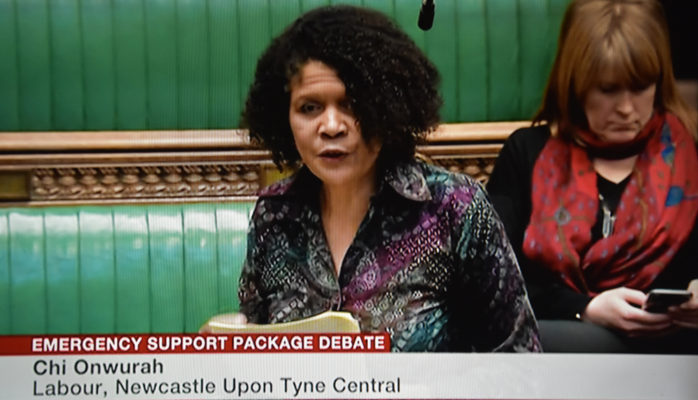Think Of Those Not Online – MP
Local MP Chi Onwurah has called on Government to consider the millions of people without full access to online technology during the coronavirus crisis, and after.
“Access to, and ability to use the internet is not evenly spread across our society”, she told a near empty House of Commons, sitting for the last time before an early Easter recess.
Of those who are connected, 4.3 million “do not have the real digital skills to use it”. Half of those without digital access are over 75. A further 12% of those aged 11- 18 reported having no internet access at home from a computer or tablet. Across all age groups, disabled adults make up a large proportion of adult internet non-users.
“In normal times, access to the internet improves hugely the chances of, for example, finding work. It is essential to access universal credit and it enables people to connect and communicate better with family, friends and the community. These are not normal times, however, and for the next few weeks and perhaps the next few months, social distancing is going to be the norm.
“We have heard about the implications for mental health of isolation without the ability to communicate”, she said, urging Government to “think about what that means for the 11% who have no access to the internet.”
Social distancing needs to be accompanied by “a digital coming together”, she argued, “and for that we need digital skills and digital access.”
“I would like to see a commitment to digital access for all, particularly for young people and schoolchildren who will be expected to be learning from home. They need to have free access to the internet to enable them to do that.”
Essential services needed extra capacity too, “for example, Newcastle upon Tyne Hospitals NHS Foundation Trust cannot provide the capacity for administrative workers to work from home,” missing out on opportunities to free up space, hospitals and car parks.
The Newcastle Central Member of Parliament also drew attention to a potential lack of internet capacity to cope with the recent ‘huge increase’ in home working.
“I fear that over the next few weeks, when we are all confined to our homes with only the internet to serve as a social medium that we can take advantage of, we will find that there is not enough capacity. Networks will fall over. There will be delays and, as always, it will be the most vulnerable and the poorest who will suffer most.”
Vague assurances that the system will cope were not sufficient. Capacity needed to be “dimensioned and built in”, she said, suggesting that capacity currently dedicated to business networks may need to be moved over to support home networks.
“This is a war”, said Onwurah, with real heroes helping us to drive out coronavirus who should be rewarded. “After the Second World War, we had the national health service, homes fit for heroes and the welfare state. After this battle, we need an economy fit for heroes.”
“Much of the real world is going online and we need to ensure that we have a real-world community, as well as real employment and a real support and welfare sector for when the crisis is over, when we can build an economy fit for the heroes we will create.”
GH

